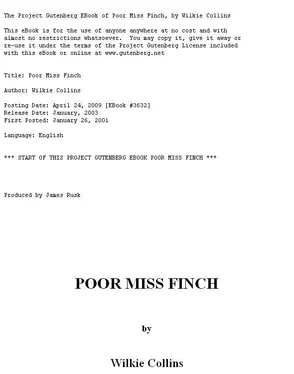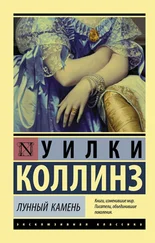Уилки Коллинз - Poor Miss Finch
Здесь есть возможность читать онлайн «Уилки Коллинз - Poor Miss Finch» весь текст электронной книги совершенно бесплатно (целиком полную версию без сокращений). В некоторых случаях можно слушать аудио, скачать через торрент в формате fb2 и присутствует краткое содержание. Год выпуска: 2002, Жанр: Классическая проза, на английском языке. Описание произведения, (предисловие) а так же отзывы посетителей доступны на портале библиотеки ЛибКат.
- Название:Poor Miss Finch
- Автор:
- Жанр:
- Год:2002
- ISBN:нет данных
- Рейтинг книги:3 / 5. Голосов: 1
-
Избранное:Добавить в избранное
- Отзывы:
-
Ваша оценка:
- 60
- 1
- 2
- 3
- 4
- 5
Poor Miss Finch: краткое содержание, описание и аннотация
Предлагаем к чтению аннотацию, описание, краткое содержание или предисловие (зависит от того, что написал сам автор книги «Poor Miss Finch»). Если вы не нашли необходимую информацию о книге — напишите в комментариях, мы постараемся отыскать её.
Poor Miss Finch — читать онлайн бесплатно полную книгу (весь текст) целиком
Ниже представлен текст книги, разбитый по страницам. Система сохранения места последней прочитанной страницы, позволяет с удобством читать онлайн бесплатно книгу «Poor Miss Finch», без необходимости каждый раз заново искать на чём Вы остановились. Поставьте закладку, и сможете в любой момент перейти на страницу, на которой закончили чтение.
Интервал:
Закладка:
I looked along her finger, and strained my eyes to see. All I could make out was a dim greyish mist, with something like a little spot or blur on it, at the place which the maid's finger indicated as the position occupied by the two ships.
The idea struck me for the first time that the dimness which I had attributed to the mist, was, in plain truth, the dimness in my own eyes. For the moment I was a little startled. I left the window, and made the best excuse that I could to the girl. As soon as it was possible to dismiss her, I sent her away, and bathed my eyes with one of Grosse's lotions, and then tried them again in writing this entry. To my relief, I can see to write better than I did earlier in the morning. Still, I have had a warning to pay a little more attention to Grosse's directions than I have hitherto done. Is it possible that he saw something in the state of my eyes which he was afraid to tell me of? Nonsense! Grosse is not the sort of man who shrinks from speaking out. I have fatigued my eyes—that is all. Let me shut up my book, and go down-stairs to breakfast.
Ten o'clock. —For a moment, I open my Journal again.
Something has happened which I must positively set down in the history of my life. I am so vexed and so angry! The maid, (wretched chattering fool!) has told my aunt what passed between us this morning at my window. Miss Batchford has taken the alarm, and has insisted on writing, not only to Grosse, but to my father. In the present embittered state of my father's feelings against my aunt, he will either leave her letter unanswered, or he will offend her by an angry reply. In either case, I shall be the sufferer: my aunt's sense of injury—which cannot address itself to my father—will find a convenient object to assail in me. I shall never hear the last of it. Being already nervous and dispirited, the prospect of finding myself involved in a new family quarrel quite daunts me. I feel ungratefully inclined to run away from Miss Batchford, when I think of it!
No signs of Oscar; and no news of Oscar—yet.
Twelve o'clock. —But one trial more was wanted to make my life here quite unendurable. The trial has come.
A letter from Oscar (sent by a messenger from his hotel) has just been placed in my hands. It informs me that he has decided on leaving Ramsgate by the next train. The next train starts in forty minutes. Good God! what am I to do?
My eyes are burning. I know it does them harm to cry. How can I help crying? It is all over between us, if I let Oscar go away alone—his letter as good as tells me so. Oh, why have I behaved so coldly to him? I ought to make any sacrifice of my own feelings to atone for it. And yet, there is an obstinate something in me that shrinks—What am I to do? what am I to do?
I must drop the pen, and try if I can think. My eyes completely fail me. I can write no more.
[Note.—I copy the letter to which Lucilla refers.
Nugent's own assertion is, that he wrote it in a moment of remorse, to give her an opportunity of breaking the engagement by which she innocently supposed herself to be held to him. He declares that he honestly believed the letter would offend her, when he wrote it. The other interpretation of the document is, that finding himself obliged to leave Ramsgate—under penalty (if he remained) of being exposed by Grosse as an impostor, when the surgeon visited his patient on the next day—Nugent seized the opportunity of making his absence the means of working on Lucilla's feelings, so as to persuade her to accompany him to London. Don't ask me which of these two conclusions I favor. For reasons which you will understand when you have come to the end of my narrative, I would rather not express my opinion, either one way or the other.
Read the letter—and determine for yourselves:
"MY DARLING,—After a sleepless night, I have decided on leaving Ramsgate, by the next train that starts after you receive these lines. Last night's experience has satisfied me that my presence here (after what I said to you on the pier) only distresses you. Some influence that is too strong for you to resist has changed your heart towards me. When the time comes for you to determine whether you will be my wife on the conditions that I have proposed, I see but too plainly that you will say No. Let me make it less hard for you, my love, to do that, by leaving you to write the word—instead of saying it to me. If you wish for your freedom, cost me what it may, I will absolve you from your engagement. I love you too dearly to blame you. My address in London is on the other leaf. Farewell!
"OSCAR."
The address given on the blank leaf is at an hotel.
A few lines more in the Journal follow the lines last quoted in this place. Except a word or two, here and there, it is impossible any longer to decipher the writing. The mischief done to her eyes by her reckless use of them, by her fits of crying, by her disturbed nights, by the long-continued strain on her of agitation and suspense, has evidently justified the worst of those unacknowledged forebodings which Grosse felt when he saw her. The last lines of the Journal are, as writing, actually inferior to her worst penmanship when she was blind.
However, the course which she ended in taking on receipt of the letter which you have just read, is sufficiently indicated by a note of Nugent's writing, left at Miss Batchford's residence at Ramsgate by a porter from the railway. After-events make it necessary to preserve this note also. It runs thus:—
"MADAM,—I write, by Lucilla's wish, to beg that you will not be anxious on discovering that your niece has left Ramsgate. She accompanies me, at my express request, to the house of a married lady who is a relative of mine, and under whose care she will remain, until the time arrives for our marriage. The reasons which have led to her taking this step, and which oblige her to keep her new place of residence concealed for the present, will be frankly stated to you and to her father on the day when we are man and wife. In the meantime, Lucilla begs that you will excuse her abrupt departure, and that you will be so good as to send this letter on to her father. Both you and he will, I hope, remember that she is of an age to act for herself, and that she is only hastening her marriage with a man to whom she has been long engaged, with the sanction and approval of her family—Believe me, Madam, your faithful Servant,
"OSCAR DUBOURG."
This letter was delivered at luncheon-time—almost at the moment when the servant had announced to her mistress that Miss Finch was nowhere to be found, and that her traveling-bag had disappeared from her room. The London train had then started. Miss Batchford, having no right to interfere, decided—after consultation with a friend—on at once traveling to Dimchurch, and placing the matter in Mr. Finch's hands.—P.]
CHAPTER THE FORTY-SIXTH
The Italian Steamer
LUCILLA'S Journal has told you all that Lucilla can tell. Permit me to reappear in these pages. Shall I say, with your favorite English clown, reappearing every year in your barbarous English pantomime, "Here I am again: how do you do?" No—I had better leave that out. Your clown is one of your national institutions. With this mysterious source of British amusement let no foreign person presume to trifle.
I arrived at Marseilles, as well as I can remember, on the fifteenth of August.
You cannot be expected to feel any interest in good Papa. I will pass over this venerable victim of the amiable delusions of the heart, as rapidly as respect and affection will permit. The duel (I hope you remember the duel?) had been fought with pistols; and the bullet had not been extracted when I joined my sisters at the sufferer's bedside. He was delirious and did not know me. Two days later, the removal of the bullet was accomplished by the surgeon in attendance. For a time, he improved after this. Then there was a relapse. It was only on the first of September that we were permitted to hope he might still be spared to us.
Читать дальшеИнтервал:
Закладка:
Похожие книги на «Poor Miss Finch»
Представляем Вашему вниманию похожие книги на «Poor Miss Finch» списком для выбора. Мы отобрали схожую по названию и смыслу литературу в надежде предоставить читателям больше вариантов отыскать новые, интересные, ещё непрочитанные произведения.
Обсуждение, отзывы о книге «Poor Miss Finch» и просто собственные мнения читателей. Оставьте ваши комментарии, напишите, что Вы думаете о произведении, его смысле или главных героях. Укажите что конкретно понравилось, а что нет, и почему Вы так считаете.






